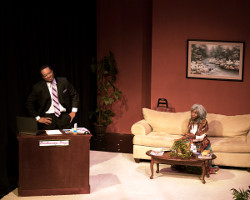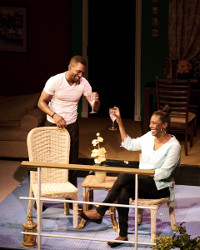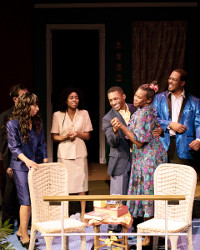
Barney Yates
UP ON THE ROOF
"Roof-Top Joy" by Andrea J. Fulton, directed by
Ward Nixon
"Roof-Top Joy" by Andrea Fulton is a play about how you can be one thing and pretend to be another. The residents of a luxury apartment building, most of them African-American, are in different stages of "being there." The concierge knows that he should be there because he works there, but thinks that certain of the tenants should not. The "dubious" tenants include Mrs. Garbicand, a possibly homeless gypsy, and "Woodie" Wittiswood, who may or may not be living off Jah-niece, the God-fearing West Indian woman. The only person he's sure belongs there is Breckenridge, who appears to be a rich white dude. But Uncle Thomas is wrong; the guy is actually a pretentious squatter. In fact, nobody in the building is who they seem to be. That, it seems, is the concern of the play. There are many statements about race and class. I am going to go out on a limb and say that the themes of class outweigh those about race.
The apartment building is named Breckenridge Plaza and Mr. Breckenridge is living off the assumption that it is named for him. He is the only Caucasian charter in the play. The concierge character is named Uncle Thomas, and his character name is a not-so-subtle comment that his credulousness is a case of Black self-hatred. He thinks Breckenridge is who he seems to be and everybody else is too. Breckenridge keeps popping up in other people's apartments because he is showering in them. He actually lives downstairs in the mechanical room. Wittiswood is an ex-con who is turning his life around. It turns out that he and Jah-niece are secretly married and she will, surprise!, be revealed as the unlikely owner of the building. Mrs. Garbicand casts spells on everybody. She is actually 26 but wears a gray wig so people will think she is 56 and so that they will not hassle her about her weed. She smokes on the roof and it's medicinal. Uncle Thomas prays there. By the end of the play, when everyone is revealed for who they really are, Uncle Thomas emcees a roof top party in which everybody erupts in snatches of popular songs. The roof-top party, i.e. Roof-Top Joy, is a metaphor for what the author thinks we should all rise to: folks just being folks and everybody accepting everybody else without pretense. A perfect place where we have no need to deceive each other.
Is it a sin to assume the characteristics of a higher class, to make it seem like you belong there-in a place like a luxury apartment building? Class, the playwright seems to say, is a label we put on by assuming the attributes of people we want to seem to be. It crosses racial boundaries. I think that the weird thing of this social phenomenon is that people maintain "class loyalty." They ostracize their friends and relatives if they suspect them of "class drift"--if they might rise or fall in class. "Roof-Top Joy" doesn't actually fault anybody for wanting to seem like somebody who belongs in a classy high-rise. It just sort of mocks them for the masquerade. I hope soon to read a lot about the social anthropology of class consciousness. It's becoming a favored topic of interest to me. It's a really interesting subject. I wish the play had brought me to an epiphany about it. But overall, the production put me off such serious musings because its shortcomings were distractingly off-putting. The text seemed verbose and overly direct. The acting started off pushed and it didn't get better as the play rolled along. Overall, I couldn't understand much of the dialogue through the shouting. Mr. Breckenridge's phony English accent was, well, phony. Scene breaks occurred between unchanging moments in the script, making me wonder what the author--or maybe it was the director--was thinking of. The dialogue was unvaryingly direct in tone and laced with quotes from top-40 songs. Please skim these concluding speeches, so you can catch the flavor of the dialogue: In the final scene, Breckenridge confesses, "I’m not Allsgood Breckenridge. I’m just somebody that has gotten really good at pretending....All I have ever known is pretending. My father pretended to love my mother. My mother pretended he didn’t hurt her. We all pretended my dad’s time in Vietnam didn’t affect us all. Next thing you know it wasn’t just him diagnosed with post traumatic sress disorder. It was her and me too. After all, the trauma wasn’t just my daddy’s battle. And just like the men in Vietnam kept themselves drugged up not to feel the pain, I did too until finally I at least got some help and some training, learned how to fix things. Couldn’t really fix my life but I at least could fix some things. And I cleaned up good, learned the power of a good suit, and my white skin and my smile. Is that enough truth for you? There are bad people in this world who seek to harm others for their own personal gain. I’m not one of those. I never meant to bring harm to nobody. Just tryin’ to survive." To this, Uncle Thomas confesses, "My papa was a rolling stone. Just like the song, where ever he layed his hat was his home. And when he died, all he left us was a loan. His daddy, (my granddaddy), was a shoe shine boy. A shoe shine boy. A grown ass man was a shoe shine boy and that was what he worked his way up to. Before that, he was a share cropper. I told Allsgood a little bit of this story. Told him my granddaddy was a share cropper and how he was probably pickin cotton while HIS daddy was probably pickin stocks. I never got up to the part of the story where I heard my granddaddy graduated to bein’ a shoe shine boy. My daddy said he told him to never be too proud to beg…. that the way he became that shoe shine boy was when he was hurt in the field, he couldn’t stand or walk too good anymore. So he begged the plantation owner to please find something that he could do sittin’ down. So he taught him how to shine shoes. My daddy was so embarrassed by this story that he figured he would never ask nobody for nothin’ and that he would never owe nobody nothin’. Well, that didn’t work for long. He realized with too much pride and too little education, he couldn’t get far unless he decided to take what he needed. So he wound up in jail first and then on an unemployment line next. In some ways, he was like the worst example of a black man to me. At times I hated him so much not even just cause I saw him as lazy and trifling but more because I found myself hating the me that was anything like him. I couldn’t stop the cynicism and self-hatred and honestly it was only after this morning when I was on the roof-top and prayed that God opened my eyes to the love I have in side and all around me." The message of the play is in these speeches, I guess. Amen, at least, to honest confessions. |
| museums | NYTW mail | recordings | coupons | publications | classified |



